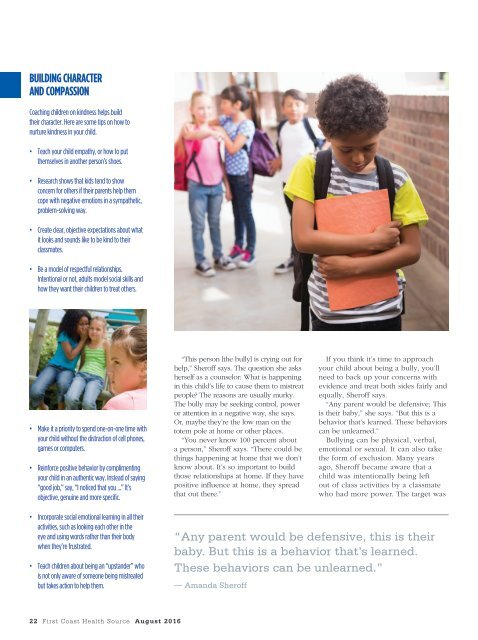HS_Aug16_ForOnline_HiRes
Create successful ePaper yourself
Turn your PDF publications into a flip-book with our unique Google optimized e-Paper software.
BUILDING CHARACTER<br />
AND COMPASSION<br />
Coaching children on kindness helps build<br />
their character. Here are some tips on how to<br />
nurture kindness in your child.<br />
• Teach your child empathy, or how to put<br />
themselves in another person’s shoes.<br />
• Research shows that kids tend to show<br />
concern for others if their parents help them<br />
cope with negative emotions in a sympathetic,<br />
problem-solving way.<br />
• Create clear, objective expectations about what<br />
it looks and sounds like to be kind to their<br />
classmates.<br />
• Be a model of respectful relationships.<br />
Intentional or not, adults model social skills and<br />
how they want their children to treat others.<br />
• Make it a priority to spend one-on-one time with<br />
your child without the distraction of cell phones,<br />
games or computers.<br />
• Reinforce positive behavior by complimenting<br />
your child in an authentic way. Instead of saying<br />
“good job,” say, “I noticed that you ...” It’s<br />
objective, genuine and more specific.<br />
“This person [the bully] is crying out for<br />
help,” Sheroff says. The question she asks<br />
herself as a counselor: What is happening<br />
in this child’s life to cause them to mistreat<br />
people? The reasons are usually murky.<br />
The bully may be seeking control, power<br />
or attention in a negative way, she says.<br />
Or, maybe they’re the low man on the<br />
totem pole at home or other places.<br />
“You never know 100 percent about<br />
a person,” Sheroff says. “There could be<br />
things happening at home that we don’t<br />
know about. It’s so important to build<br />
those relationships at home. If they have<br />
positive influence at home, they spread<br />
that out there.”<br />
If you think it’s time to approach<br />
your child about being a bully, you’ll<br />
need to back up your concerns with<br />
evidence and treat both sides fairly and<br />
equally, Sheroff says.<br />
“Any parent would be defensive; This<br />
is their baby,” she says. “But this is a<br />
behavior that’s learned. These behaviors<br />
can be unlearned.”<br />
Bullying can be physical, verbal,<br />
emotional or sexual. It can also take<br />
the form of exclusion. Many years<br />
ago, Sheroff became aware that a<br />
child was intentionally being left<br />
out of class activities by a classmate<br />
who had more power. The target was<br />
• Incorporate social emotional learning in all their<br />
activities, such as looking each other in the<br />
eye and using words rather than their body<br />
when they’re frustrated.<br />
• Teach children about being an “upstander” who<br />
is not only aware of someone being mistreated<br />
but takes action to help them.<br />
“Any parent would be defensive, this is their<br />
baby. But this is a behavior that’s learned.<br />
These behaviors can be unlearned.”<br />
— Amanda Sheroff<br />
22 First Coast Health Source August 2016

















